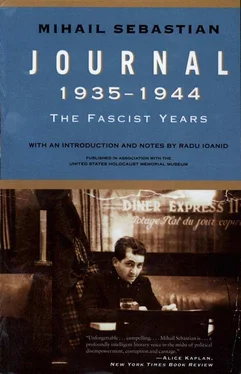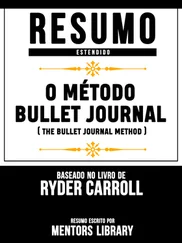Yesterday evening at the Continental, Sandu Tudor was at a table with Devechi and Onicescu. 8Two years ago he asked me to put in a word so that Nae Ionescu would bring him onto the journal. Nae laughed, but I think Devechi would have found something like that really bizarre. A cretinous journalist — that is how S.T. would have seemed to him.
But what counts is not whether people are stupid or clever, good or bad, honest or crooked. The only real factor is power — and that can be obtained through money, blackmail, social position, or whatever. Then every other criterion ceases to apply. But it was a pleasure for me to go over to their table and speak to Devechi and Onicescu without noticing Sandu Tudor. I too have my little acts of revenge; others obviously don’t care much for them, but they give me satisfaction.
I must admit that, if I went into the Continental yesterday for no particular reason, it was only in the hope (perhaps not openly avowed) that I would meet Leni there.
And I did meet her. . She was there with her sister Olga, Froda, and Solacolu. 9She is beautiful. I was pleased to see her, and she seemed glad too — but I am well aware that her suddenly flashing smile is only a tic, not an expression, and that it would have been just as nice, just as enveloping, for anyone else who had approached her table.
Otherwise nothing has changed. She has the same things to do in town that she had in the summer — the same troubles with her dressmaker and hairdresser, the same shopping, the same haste and indifference, the same air of frivolity, the same visible lack of sensitivity.
Nothing has changed, but now it will certainly be much easier for me to break things off. I think I have succeeded in eliminating all the painful aspects of this love, though some of its roots have remained. Watch out, kid!
I saw Lilly one evening: we went to a cinema and then to the Corso (where absolutely all the stares directed at us had a kind of shocked and aggressive surprise). I was glad to see her again, and I fondly imagine that one day I will attain the same point of calm and dispassionate sympathy with Leni. I think Leni is less interesting outside a context of love. But in terms of love, let her make herself at home!
[Wednesday,] 18 September
I have seen a lot of people this week, but I was too lazy to write a page in my journal for each. Too tiring. I write here only when it gives me pleasure — though I know that the real pleasure is in rereading, and that I should therefore be a more diligent “journalist.”
The evening before last, I had something more than a surprise with the painter Siegfried. 1I felt bored at the thought of our meeting, having stupidly arranged it in a careless moment because I wanted to be friendly.
When we met, he was with “Jojo” Orleanu — and at first I tried to keep him with us. “An evening with two homosexuals,” I said to myself. “It’ll be entertaining; I’ll be able to observe all kinds of gestures and play-acting.”
How hastily I judge things! Orleanu left soon afterward and Siegfried proved to be an excellent conversation partner, an intelligent, sensitive, and modest young man. He talked about Paris, and he had an exact manner of speech filled with details that evoked the city much better than nostalgic outpourings usually do.
He spoke about his painting and his studies with André Lhote, explained the technique of etching — all very modest and simple, but clear and precise, with a host of accurate observations. He was quite simply instructive.
I do not know how exceptional a person he is. But everything he said to me was tasteful and measured. He is working on the scenery for a play by Géraldy at the Bulandra, and he spoke finely about his future projects. A pleasant evening.
Yesterday evening I repeated the experience with another stranger, a student of Nae’s called Mircea Niculescu. Not so interesting, of course, but undoubtedly clever — and, most important of all, a new face, someone from outside my usual circle, another world, other stories, other books.
We spoke “politics”—which was not terribly exciting — but he said useful and heartening things about the chances that Hitlerism might collapse. He is a radical, and that is such a rare species among Romanians.
Finally a day with women.
First a visit to Dorina Blank, 2who had suddenly and insistently invited me round on such a childish pretext (she wanted me to read and explain a novel she did not understand) that it was obvious she was after something else. She has taken a fancy to me, and she does not try at all to disguise this incipient béguin. Marietta Rareş 3was also there, and Ţoţa Soiu 4later turned up unexpectedly, but she did not feel inhibited in front of them. “Oh, Dorina, I don’t understand you at all,” said Marietta, a little embarrassed.
Naturally I shall see her again. (An amusing detail: she, Dorina, was the one who, on the eve of my departure for Ghilcoş this summer, never stopped pestering me on the telephone. For a whim, it has lasted rather a long time. Another, equally amusing, detail. Dorina insisted that Carol Grünberg 5invite both me and her round to a lunch. The lunch was last Sunday, but Carol did not invite me, even though we had been together on Saturday evening at the premiere at the National. Jealous?)
Finally, on leaving Dorina’s, a visit to Leni. The first since our parting in June.
I am content with myself. Apart from a few little gestures of irritation, I did not make a wrong step. She complained that she didn’t recognize me, that I had grown cold, etc. (without pressing the point, however, because she is basically indifferent), and I objected with as much good faith as I could affect. Anyway, it was enough for her.
She is still the same. She would like me to love her — not me in particular, but tens of thousands of men, including me. She spent nearly twenty minutes on the phone with a guy who had called to speak with her sister, Olga, but who meanwhile enjoyed “teasing” her a little.
Then she apologized to me, but I tersely said there was no need.
“Don’t apologize, Leni dear. I’m happy that you thought me a good enough friend to do something you would certainly never have done with a stranger.”
She took the point, but I should not be so naive as to think that she regretted anything. Her capacity to forget is formidable.
No real catastrophe, then. It is still possible to end everything, without suffering. I still have moments of stupid melancholy, when I find any number of excuses for her and make all kinds of plans. I really must stop doing this.
It would be wise not to call her for a fortnight or so. At the moment that doesn’t seem too difficult. What if I were to try it out? But I don’t know how to make that kind of pledge, nor do I have the courage to do so.
I end the day now, at ten o’clock, by listening to a musical broadcast from Munich. A Bach fantasia and a Schumann symphony. This is a fine epilogue to a few trifles of which, if I were serious, I should perhaps feel a little ashamed.
The radio is tuned to Juan-les-Pins, which is coming over loud and clear this evening. I have listened to a fragment from Ravel’s Ma mère l'Oye and to Debussy’s Ménestrels. Now there are some romances.
If I were to record here everything I have listened to recently, it would come to a very long list. At first I thought it a wild idea of Ghe-orghe’s 6that I should write music reviews for L’Indépendence Roumaine. I accepted for the money, with strict guarantees of anonymity. But I am used to it now, after my third contribution, and my weekly concert evening gives me great pleasure.
Читать дальше











